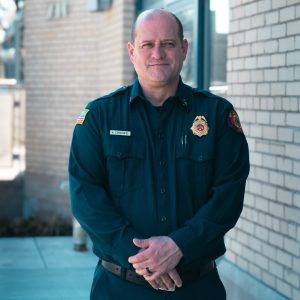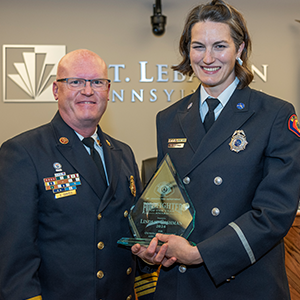Town Topics

MT. LEBANON CONTINUES STORMWATER UPGRADES Since instituting a separate stormwater fee as a way to pay for mandated infrastructure improvements without placing a burden on the municipality’s general fund budget, Mt. Lebanon has spent more than $14 million on curb replacement, street reconstruction, water quality issues and requirements of the U.S. Environmental Protection Agency’s National Pollutant Discharge Elimination System.
Mt. Lebanon was one of the first communities in the state to approach stormwater funding with a separate fee.
When Commissioners adopted the fee in 2011, it was with a sunset provision ending the fee in 2031. In 2023, the Commission voted to eliminate the sunset date and extend the ordinance instituting the fee indefinitely.
Along with voting to extend the life of the stormwater fee, commissioners voted to raise the fee to cover rising costs. Beginning this month, households that paid $8 per month will pay $9. The monthly fee will increase to $10.13 in 2025, $11.39 in 2026, $12.81 in 2027 and $14.42 in 2028.
“I realize we’re increasing a fee,” said municipal manager Keith McGill at a Commission discussion session, “But we’re improving safety and we’re also in some ways reducing public works’ response—they have a whole list of ice spots that, when we have a snow event, they’ve got to make sure they’re hitting them frequently.”
Major projects funded through the stormwater fee in 2023 included $645,000 in curb replacement in concert with street reconstruction
Icing reduction projects on Broadmoor Avenue, Greenhurst Drive, Mt. Lebanon Boulevard, Macarthur Drive and Oak Park Place, tying homes into the stormwater system to reduce water drainage on the street, at a total cost of $170,570
Stream restoration on Thornwood Drive, improving the stream bed and stream banks to reduce future erosion, at a cost of $127,314
Mt. Lebanon has allocated $3,155,200 for stormwater related improvements in 2024.
 LOOKING FOR VOLUNTEERS FOR NEW BOARDS For decades, Mt. Lebanon has had more than a dozen boards and authorities: volunteer groups with specific purposes and charges to make Mt. Lebanon a better place. Whether it was the community relations board, which conducted mediations between residents who had come to impasses, or the traffic board, which heard requests for stop signs in areas with limited visibility, the boards provided vital advice to Commissioners.
LOOKING FOR VOLUNTEERS FOR NEW BOARDS For decades, Mt. Lebanon has had more than a dozen boards and authorities: volunteer groups with specific purposes and charges to make Mt. Lebanon a better place. Whether it was the community relations board, which conducted mediations between residents who had come to impasses, or the traffic board, which heard requests for stop signs in areas with limited visibility, the boards provided vital advice to Commissioners.
But each of those 17 boards had a staff liaison and a Commission liaison. We have only five Commissioners and fewer than a dozen members of senior staff to serve as liaisons. Toss in two regularly scheduled Commission meetings a month, and that meant many hours of time. It also meant we needed more than 110 volunteers to serve on the boards. Finally, some of the boards were created for purposes that have since changed. As a result, the Commission wanted to rethink the way it structured its boards and authorities.
Ian McMeans, Mt. Lebanon’s assistant manager and municipal planner, led the restructuring project. Over a period of months, he scoured our ordinances and devised an efficent way to move ahead.
First things first: Many boards are not changing. We have statutory boards, such as the zoning hearing board and the planning board, which have specific roles laid out by state or local law.
Board of Appeals
Civil Service Board
Hospital Authority
Library Board
Medical Rescue Team South Authority
Planning Board
Zoning Hearing Board
Industrial Development Authority
Boards that will sunset on March 31 are:
Community Relations Board
Economic Development Council
Environmental Sustainability Board
Equal Opportunity Board
Historic Preservation Board
Parks Advisory
Parking Facility Board
Pension Investment Advisory Board
Traffic Board
New boards that will begin on April 1 are:
Civic Engagement Advisory Board
Mobility and Transportation Advisory Board
Parks and Recreation Advisory Board
Community Sustainability and Economic Development Advisory Board
Financial Management Advisory Board
“The streamlining of the advisory boards will improve the efficiency of our internal processes and increase dialogue between interested parties to produce projects recommended by the Comprehensive Plan,” McMeans said. “We’re excited to tap into the knowledge and talents of our residents to help achieve the plan’s goals.”
The Commission passed an ordinance in February of 2023 outlining the duties and purposes of the new boards.
Since the ordinance passed, the Comprehensive Plan has evolved, and five themes emerged from the public sentiment. Those topics closely align with each of the new boards and will serve as a blueprint for those boards to act. Each of the sunsetting boards also provided staff with specific work they hope will continue in the new structure.
It’s now time for residents to apply to the boards that match their skills and interests. To see all the boards and authorities and read about their purposes and duties, and to access the online application, go to mtlebanon.org/boards. All applications must be filled out by February 1.

NEW COMMISSIONER Jeff Siegler is Mt. Lebanon’s new Commissioner for Ward 1. Siegler lives on Arden Road with his wife, Amber, two sons and two daughters.
A community revitalization consultant, Siegler is the author of Your City is Sick. He moved to Mt. Lebanon in 2016, following 10 years as the head of the Main Street Program in Ohio. His volunteer activities include coordinating the Mt. Lebanon Adult Kickball League, coaching Lebo Cup soccer and serving on the programming committee of the Urban Land Institute. His email address is jsiegler@mtlebanon.org.
STORMWATER BILL Keep your eyes peeled for your 2024 stormwater bill, which will be mailed to you in early February. If you want a 2 percent discount, you can pay by the end of April or you can pay by the end of August to pay the bill at face value. At press time, the Commission was considering adding a fee for our curbside solid waste collection. If that item was passed in the budget in December, that fee will appear on the same bill, with the same deadlines.
HISTORIC HOUSES The Historical Society of Mount Lebanon is selling medallions identifying those properties in the Mt. Lebanon National Register Historic District as contributing to the historic designation. The cast aluminum medallions are 6 inches in diameter and include mounting screws and anchors. Cost is $214. Is your house in the district? Visit the Historic Properties section of the municipal website to see a map that shows the location of the 4,400 properties.
 LOOKING FOR ANGELS Mt. Lebanon’s snow ordinance requires sidewalks to be cleared within 24 hours following the end of a snowfall of more than one inch. Businesses have four hours to clear their sidewalks.
LOOKING FOR ANGELS Mt. Lebanon’s snow ordinance requires sidewalks to be cleared within 24 hours following the end of a snowfall of more than one inch. Businesses have four hours to clear their sidewalks.
For seniors and others who may have trouble keeping their sidewalks clear, the municipality has a program called Snow Angels, matching volunteer snow shovelers with residents who need to have the sidewalks in front of their homes cleared. Volunteers must be at least 15 years old, or be accompanied by a parent or guardian, and must commit to taking at least one household for the winter. Volunteers must bring their own equipment.
The municipality is not responsible for providing the service, but will act as a clearinghouse, matching volunteers with residents. You can find more information on the program here.

SAVE THE DATES The Mt. Lebanon Historic Preservation Board is presenting a three-part series on making homes more sustainable, safe and salable while still maintaining the home’s architectural integrity. All presentations are from 7 to 8:30 p.m., at the Howard Hanna Mt. Lebanon office, 701 Washington Road.
On February 20, speakers from Howard Hanna Real Estate, Keystone Building Inspections and the Mt. Lebanon Fire Department will discuss maintenance, home inspection, and safety issues.
The March 5 topic is exterior opportunities, with discussions on sustainable landscaping and the feasibility of adding solar panels, with presenters from LBA landscaping Architects and Envinity Solar.
The final presentation, on March 19, will focus on using sustainable materials in renovation projects and practical conservation tips on saving electricity, water and gas, and reducing paper consumption and food waste, with presenters from Smith Group Architects and Mt. Lebanon High School.
Register or get more information here.

PLANNING FOR MORE INCLUSIVE TRANSPORTATION Like every other community in the country, Mt. Lebanon’s streets are designed primarily to facilitate automotive traffic. As the municipality finalizes its latest comprehensive plan, lawmakers are looking at ways to accommodate other forms of getting around. As part of that commitment, Mt. Lebanon’s Office of Community Development has requested $80,000 to develop an active transportation plan, taking other forms of getting around into consideration.
The US Department of Energy defines active transportation as “human-powered mobility, such as biking, walking or rolling,” which reduces our carbon footprint.
“Active transportation aims to level the playing field for other modes of transportation,” said Mt. Lebanon Commercial Districts Manager Eric Milliron.
Milliron said the study will define policy, funding, infrastructure projects, implementation priorities and performance measures for increasing active transportation. Ideas include a complete sidewalk network, more traffic calming, safer school routes and improved bike infrastructure, “but not at the expense of other street uses,” said Milliron.
In 2022, the Commission adopted a climate change resolution, with a goal of reaching community-wide net-zero carbon emissions by 2050. One of the steps in achieving that goal was to adopt a Complete Streets policy, aiming to reduce reliance on single-occupancy vehicle traffic, and increase accessibility and connectivity.
In connection with the active transportation study, Milliron said Mt. Lebanon is applying for a $100,000 grant from the U.S. Department of Transportation’s Reconnecting Communities and Neighborhoods program to further the plan.





